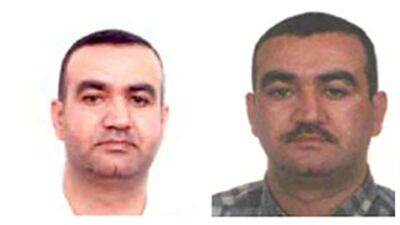The Special Tribunal for Lebanon on Friday sentenced Hezbollah operative Salim Ayyash to five counts of life in prison over the assassination of prime minister Rafik Hariri 15 years ago.
Ayyash was tried in his absence and is unlikely to ever serve the prison term. He received the maximum sentence for each of the five counts in the indictment. He can still appeal his sentence.
The tribunal found Ayyash guilty in August of all charges brought against him for the assassination of Hariri, including conspiracy to commit a terrorist act and the attempted intentional homicide of 226 people who were injured during the blast.
“The crimes are so serious as to attract the maximum sentence,” Judge David Re said. “The offences are so serious that very few circumstances could equate to mitigating features that could reduce the appropriate sentence. There are none here.”
Three other Hezbollah operatives were cleared by the tribunal for lack of evidence. All four suspects had been tried in their absence and Ayyash is still on the run as Hezbollah refuses to hand him over to justice.
The international court was set up in 2009 by the UN at the request of the Lebanese government to investigate the killing of prime minister Rafik Hariri. The terror attack destabilised the country and was followed by a string of high-profile targeted killings.
On February 14, 2005 a truck carrying 2,500 to 3,000 kilograms of TNT detonated as Hariri’s convoy passed by on the Beirut corniche, killing him and 21 others. The explosion was so strong it left a crater 11 metres wide and 2 metres deep in the road and was heard miles away.
Ayyash has evaded justice since being indicted in 2011 and Lebanese authorities have been unable to locate him.
“Those shielding Ayyash from justice should surrender him to the tribunal,” Judge Re said. Hezbollah leader Hassan Nasrallah has publicly defended Ayyash and the other suspects at the time, describing them as "honourable" men and said he would not hand them over to justice.
The trial chamber has issued a new arrest warrant for Ayyash, transmitted to authorities in Lebanon and the Netherlands, where the tribunal is located. A red notice will also be issued to Interpol to be sent to authorities worldwide to arrest Ayyash.
Despite the lack of direct evidence, Ayyash is believed to have acted jointly with the Syrian regime to eliminate Hariri, who opposed Syria's control of Lebanon at the time of his killing.
“This political attack was aimed at eliminating a political obstacle or opponent. Although there is no direct evidence it most probably must have involved state actors. The state with the most to gain from Hariri’s elimination most likely was Syria,” Judge Janet Nosworthy said.
The Syrian regime had a heavy military presence in Lebanon and effectively controlled the country’s politics at the time of the assassination.
Hezbollah and Syria deny involvement in the killing, pointing to an Israeli conspiracy instead.
The Tribunal recommended that victims of the terrorist attack should be compensated through the establishment of a dedicated fund managed by the Tribunal and funded by international donors.
“This is achievable," said Judge Re.
The hearing on August 18 was overshadowed by the blast at Beirut port two weeks earlier, which killed more than 200 people and wounded at least 6,500.


